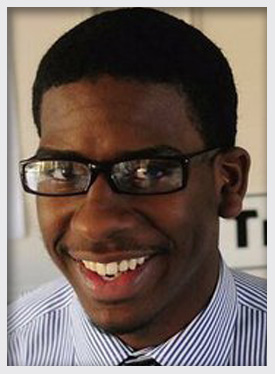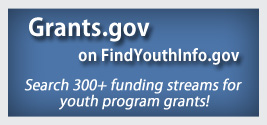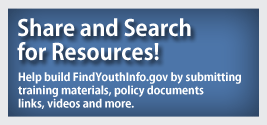Youth Voices: Sixto

“Being part of this youth board turned my anger for the foster care system into passion. I had a story but my peers did, too. It became less about me and more about a group of youth who many people forget about.”
Sixto— Youth Advocate
We spoke with Sixto via email in April 2012.
Sixto is currently attending Virginia Commonwealth University, majoring in Political Science with a concentration in Human Civil Rights. Sixto’s lifelong experience in foster care inspired him to become an advocate for other foster youth as a Jim Casey Young Fellow, and has led him to the nation’s capital advocating for change in legislation and writing articles that have been featured on NPR, the Huffington Post, and CNN. His passion for improving the foster care system for future generations drives him to seek new opportunities for creating change.
What is the Jim Casey Youth Opportunity Initiative and what opportunities has it provided you?
The Jim Casey Youth Opportunity Initiative is a national foundation devoted to helping young people leave the foster system successfully. The initiative operates the Opportunity Passport, [a program] which provides youth in foster care access to bank accounts, lessons on financial literacy, training on developing assets, and the opportunity to match savings. The initiative believes in empowering youth and engages youth as equal partners to provide their expertise as alumni of the foster care system, [and] to influence positive developmental policy and practices and supportive services. The fellowship provides the opportunity for young people to authentically engage in system reform by sharing their experience in care, reflection, and problem solving throughout the country.
Through my experience as a Young Fellow, I founded and now run a program: Stellar Works Transitional Services. I designed the program to prepare foster children for adulthood through post-secondary education. This led me to an invitation by the Jim Casey Youth Opportunity Initiative to a national training where I was selected to be part of the national board to further my advocacy. I went from having no voice to being on CNN, NPR, and other news outlets, and at Harvard Law School talking about foster care issues. Since sharing my story, I have visited the nation's capital to speak with Congressmen and lawmakers, and at conferences and agencies.
What inspired you to get involved in foster care advocacy and how did you become a Jim Casey Fellow?
At the age of 15, I re-entered the foster care system after spending years in a very toxic environment. My adoption had been one of the worst experiences in my life and I wanted answers from the state. Why was I allowed to be fostered and then adopted by someone who did not have my best interests at heart? I joined “A Voice to be Heard,” a Youth Leadership Board in Bridgeport, Connecticut, to get the answers I sought. The board was a partnership between FSW (a Connecticut-based health and human services agency formerly known as Family Services Woodfield), the Jim Casey Youth Opportunity Initiative, and the Connecticut Department of Children and Families. Being part of this youth board turned my anger for the foster care system into passion. I had a story but my peers did, too. It became less about me and more about a group of youth who many people forget about; a group of youth who are more likely to suffer negative outcomes like homelessness, incarceration, a lack of education, and a need of state assistance to survive even after foster care.
I had found my life passion, a reason to push forward despite my past. I ran for and acquired different positions until I became chair. I started to raise the level of expectation for the youth board. I knew the potential we had. After our board worked as a team to address issues in Connecticut, I understood that the work we do affects the lives of our peers in foster care. While other young people’s passions were basketball, dance, and other afterschool activities, advocating became my basketball, my dance, and my passion.
The staffs of different non-profits like FSW and True Colors (a non-profit supporting sexual minority youth and family services), and state workers (from the human services agency) worked with me to develop my speaking, facilitating, and leadership skills. The opportunity for further training came when the Jim Casey Youth Opportunity Initiative invited me to the Youth Leadership Institute (YLI). I didn’t even think twice. I took the week off of work and flew by myself for the first time to St. Louis. At YLI, I met young people from all over the country, even young people from Hawaii. I admired them and worked my hardest every day to become like some of the youth advocates I met. It was a training like no other. We laughed, learned, cried, healed, and grew together. After the conference I was asked to be a Young Fellow and I accepted it.
How has your experience in the foster care system influenced your work as a Jim Casey Young Fellow?
All of my experience influences my work as a Young Fellow. It is the reason why I am an advocate. I was America’s angriest colored child. It was a strange kind of anger because it wouldn’t allow me to burn buildings, break car windows, intoxicate myself, shoot my enemy, or even cry. However, my city is full of gangs, drugs, and angry teens living in poverty who act out their anger by shooting each other because they are too angry to function. America’s funniest man, Bill Cosby, asked in his book, “Why are we so angry?” I know why I’m angry. Nineteen years ago when I was just eleven months old, strangers came to my house and took me away. It was not until later that I realized my mother couldn’t have kept me if she tried, but she never tried. I had been shuffled between more foster homes than I can count on one hand.
Every time I speak about my experience I think about my brothers. Three out of the four have experienced jail in their teen years and my other remaining brother is resting in heaven. I think about my foster brothers and sister who have had a challenging journey. Some of these negative stories could have been avoided if someone had said something, if someone had cared. So when I am preparing to do any of the advocacy events with the Jim Casey Youth Opportunity Initiative, I look back to where I came from and remind myself of what I went through, what my brothers have gone through, and I know that some of these stories do not have to happen if we have a better system. As a young child, I was silenced to hide all the abuse and negative experiences I suffered, but I can assure you that I will always speak for what is right! Fear used to confine me but hope for a better future and for a better system has been my daily motivation.
As a Jim Casey Young Fellow, what is your main advocacy message?
“Our deepest fear is not that we are inadequate. Our deepest fear is that we are powerful beyond measure.” - Marianne Williamson.
Youth who experience foster care are among the most resilient youth in this country. We have learned to survive and achieve despite our challenges. Young Fellows are living proof. We are full with potential and if we have the right supports like foster care past 18, financial literacy, post-secondary education, and safe and stable environments, then we can achieve a successful future!

Subscribe to our newsletter for information on funding, events, publications, and more.

Tricia discusses what helped her survive despite tremendous odds. (video)
Marlon describes how a training program and afterschool photography class helped him grow. (video)
Chardae credits her mentor with helping her overcome life's challenges. (video)
Check out Bringing Learning to Life, a video describing the benefits of service-learning. (video)

Map My Community is a tool designed specifically to assist you in locating resources in your community to help you build and strengthen your youth program. Get ideas for new partnerships, identify gaps in your community, and learn about resources to avoid duplication of effort.















